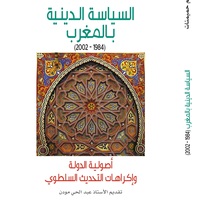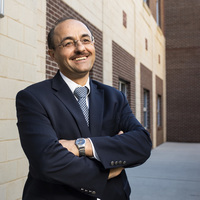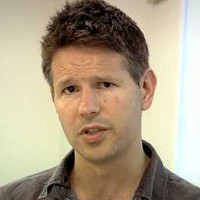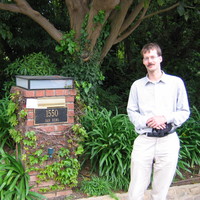
Salim Hmimnat
Salim Hmimnat has been a research fellow at the Institute of African Studies (IEA) at Mohammed V University, Rabat, Morocco, since 2012. His current research focuses on two main interrelated areas: the first one deals with the interactions between Islamist movements, religious policies, and political modernization in contemporary Morocco; the second area relates to the states’ preventive and counter-radicalization strategies in North Africa and the Sahel. Salim is the author of “The Religious Policy in Morocco (1984-2002): State Fundamentalism and Challenges of Authoritarian Modernisation” (in Arabic), Afrique Orient, 2018. His latest article “’Spiritual Security’ as a (Meta-)Political Strategy to Compete Over Regional Leadership: Formation of Morocco’s Transnational Religious Policy Towards Africa” was recently published in The Journal of North African Studies. Salim obtained his PhD in political science in 2009 from Mohammed V University, Rabat.
less
Related Authors
Christopher Anzalone
Marine Corps University
Naim Kapucu
University of Central Florida
Edith Szanto
University of Alabama - Tuscaloosa
Oliver P Richmond
The University of Manchester
Armando Marques-Guedes
UNL - New University of Lisbon
Noe Cornago
University of the Basque Country, Euskal Herriko Unibertsitatea
George Lawson
The Australian National University
Mustafa Aydin
Kadir Has University
Mauro Grondona
University of Genova
Eckart Frahm
Yale University










Uploads
Papers by Salim Hmimnat
intensively incorporated as a crucial component of a multi-pronged
strategy to combat violent extremism. Morocco’s religion-based
Prevention of Violent Extremism (PVE) strategy lies in its reliance on a
well-structured religious bureaucracy that functions in line with a
politically-oriented, inclusive vision using persuasive, sophisticated tools,
and which supposedly operates in tandem the other socio-economic and
security aspects that comprise the total national PVE strategy.
Nevertheless, this religion-based strategy suffers from several challenges
and deficiencies, including the ideological vision framing it, its
instrumentalization to serve certain political interests, and the uncertain
efficacy and effectiveness of its modes of functioning, outreach, and scope
of action. In order to improve coordination between the different
institutions involved in Morocco’s PVE strategy, an intergovernmental
body should be created that can synergize their fragmented activities. In
addition, state-run religious institutions should develop indicators to
assess the impact of their activities. Finally, religious associations and
scholars should be involved and provided with appropriate training to
effectively contribute to Morocco’s PVE efforts.
transnational religious policy toward Africa. Stemming from a pragmatic vision and functioning through multiple complex mechanisms and tools, this transnational religious policy tends to serve ambitious geostrategic goals that range from enhancing Morocco’s regional influence in Africa, to providing assistance to several African countries in need to rehabilitate their own religious establishments and back up their institutional capacity-building to prevent the growing extremist ideologies in the region. Built on the basis of common cultural heritage and doctrinal choices that historically associate the ‘Moroccan Islam’ and the ‘Sub-African Islam’, this regional religious policy would bring Morocco about a meta-political strategy to revamp Morocco–Africa relations beyond the selective bilateralism (‘Rabat-Dakar axis’) which has determined Morocco’s African policy for decades ago. Additionally, it would lead toward a kind of ‘spiritual security-based integration’ between North and West Africa. Yet, in this ambitious endeavour, Morocco has to face many challenges and difficulties, especially the sharp competition by some Middle Eastern and North African countries, which continually seek, likewise, to increase their spiritual influence in the continent.
Books by Salim Hmimnat
intensively incorporated as a crucial component of a multi-pronged
strategy to combat violent extremism. Morocco’s religion-based
Prevention of Violent Extremism (PVE) strategy lies in its reliance on a
well-structured religious bureaucracy that functions in line with a
politically-oriented, inclusive vision using persuasive, sophisticated tools,
and which supposedly operates in tandem the other socio-economic and
security aspects that comprise the total national PVE strategy.
Nevertheless, this religion-based strategy suffers from several challenges
and deficiencies, including the ideological vision framing it, its
instrumentalization to serve certain political interests, and the uncertain
efficacy and effectiveness of its modes of functioning, outreach, and scope
of action. In order to improve coordination between the different
institutions involved in Morocco’s PVE strategy, an intergovernmental
body should be created that can synergize their fragmented activities. In
addition, state-run religious institutions should develop indicators to
assess the impact of their activities. Finally, religious associations and
scholars should be involved and provided with appropriate training to
effectively contribute to Morocco’s PVE efforts.
transnational religious policy toward Africa. Stemming from a pragmatic vision and functioning through multiple complex mechanisms and tools, this transnational religious policy tends to serve ambitious geostrategic goals that range from enhancing Morocco’s regional influence in Africa, to providing assistance to several African countries in need to rehabilitate their own religious establishments and back up their institutional capacity-building to prevent the growing extremist ideologies in the region. Built on the basis of common cultural heritage and doctrinal choices that historically associate the ‘Moroccan Islam’ and the ‘Sub-African Islam’, this regional religious policy would bring Morocco about a meta-political strategy to revamp Morocco–Africa relations beyond the selective bilateralism (‘Rabat-Dakar axis’) which has determined Morocco’s African policy for decades ago. Additionally, it would lead toward a kind of ‘spiritual security-based integration’ between North and West Africa. Yet, in this ambitious endeavour, Morocco has to face many challenges and difficulties, especially the sharp competition by some Middle Eastern and North African countries, which continually seek, likewise, to increase their spiritual influence in the continent.